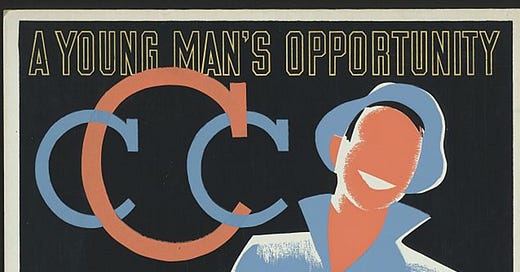In his speech accepting the Democratic Party’s nomination for president in July 1932, Franklin Delano Roosevelt proposed employing one million Americans in forestry work as a strategy to address both youth unemployment and environmental degradation. A year later, just 100 days into his presidency, the initial goal of 250,000 enrollees in the newly-created Civilian Conservation Corps was met. The CCC, as it was known, was the most successful of FDR’s early New Deal programs and ultimately enrolled over three million young men. Of the fifteen major pieces of legislation passed by Congress during FDR’s “first hundred days” in office, the CCC bill was possibly the nearest to his heart, representing both a response to unemployment and advancing the conservation of natural resources.
Bender, Albert M., Artist, and Sponsor Federal Art Project. A young man's opportunity for work, play, study & health / Bender ; made by Illinois WPA Art Project, Chicago. United States, 1941.
Donald Trump’s record for the first hundred days of the current administration stands in stark contrast. Not only has he failed to secure any meaningful legislation from Congress, he has abused executive authority to eliminate both jobs and programs protecting natural resources. In February he fired over 2,300 employees of the Department of the Interior, including 1,000 from the National Park Service and 400+ from the Fish and Wildlife Service. Fully 6,000 more were dismissed from the Department of Agriculture, including 3,400 from the US Forest Service. 1,000 more were cut from NOAA Fisheries, the agency that manages our offshore fishing resources. His most recent assault was directed at the CCC’s legacy, slashing $400 million in funding for AmeriCorps and eliminating over 32,000 positions held by young people, a large number of which focused on conservation work. And of course 450+ positions were eliminated at the Environmental Protection Agency just in time for Earth Day on April 22nd.
In the midst of the Depression, FDR understood that our natural resources—forests, water, wildlife, soil, and recreation –were not only an avenue to expanded employment, but were vital to our future health and well-being. He and the Congress alike took action to expand our national parks and forests, to support agriculture and soil health, and to develop resources like hydroelectric dams to serve some of the poorest regions of the country. The people that did this work were championed, from Hugh Hammond Bennet, the founding director of the Soil Conservation Service, to the legions of young men in the CCC. In July, 1933 Roosevelt wrote an open letter in Happy Days, the national CCC newspaper, in which he noted the work the Corps was undertaking would “…conserve our natural resources, create future national wealth, and prove of moral and spiritual value not only to those of you who are taking part, but to the rest of the country as well.”
Now, just shy of a century later, we are witnessing the intentional destruction of that legacy. Manish Bapna, president of the Natural Resources Defense Council (NRDC), recently noted that “It is not an overstatement to say that the Trump administration has launched the worst White House assault in history on the environment and public health.” This is clear from the firings, but also from his recent executive orders instructing the Department of Interior to fast-track gas, oil, and mining projects on federal lands by reducing legally-required environmental reviews from 1-2 years to less than a month, while declaring an “emergency” to allow waivers of the Endangered Species Act, the National Environmental Policy Act, and other laws intended to protect our public lands and environment.
Donald Trump’s first hundred days in office have been marked by unpredictable, erratic, and often ill-conceived actions. Many have been stopped by the courts or are facing legal challenges. Some will undoubtedly unravel as opposition grows or the true consequences become clear. But the long-term impacts of his anti-environmental agenda will be with us for generations. FDR helped establish one-in-four of our national parks, launched efforts to save our farms from the Dust Bowl, designated eleven national monuments, and saw millions put to conservation work through the CCC, WPA, and other newly-created agencies of the New Deal. Trump’s record of course remains to be fully realized, but if the first hundred days are taken as representative, the best we can hope for may be that by eviscerating our land management agencies the process of stripping environmental protections in favor of destructive, short-term development will be slowed.




